
It takes a combination of inspiration and chutzpah to reinvent a 58-year-old musical theater classic that’s been reinvented time and time again—but director Gary Lamb has done just that with Kander & Ebb’s Cabaret, his creative touches adding up to the best of the five intimate Cabarets I’ve seen and one of the top two or three of the ten productions I’ve experienced in all.
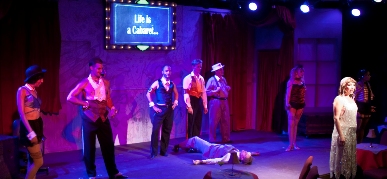
A quick glance at the Crown City Theatre Co. cast list (a mere eleven performers in place of Broadway’s original thirty-two and the current revival’s seventeen) reveals that there will be either genius or madness afoot.
Fortunately for all concerned, it turns out to be the former, Lamb having taken the lyrics of the musical’s much-recorded title song as literally as can be. Life in this latest revival is a cabaret and the cabaret we will be visiting over the next two hours is life … as experienced by Clifford Bradshaw in Berlin circa 1930 and reenacted in his mind’s eye by Kit Kat performers stepping in and out of their cabaret personae to become the dramatis personae of Cliff’s brief but life-altering stay in the German capital. (Click here for background on Cabaret The Musical as well as a look at its plot and cast of characters.)
A newsreel montage played in reverse takes us back in time from post-WWII Germany to the rise of Hitler and the Nazi Party to the year just after the Stock Market Crash as our narrator Cliff begins his reminiscences with words any musical theater lover will recall: “There was a cabaret, and there was a master of ceremonies … and there was a city called Berlin, in a country called Germany … and it was the end of the world.”
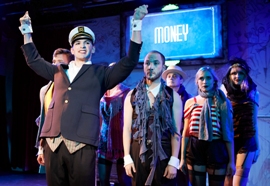 We are then transported back in Cliff’s mind to that city and that cabaret and that Emcee (Eric Sand), no longer the sleazy, emaciated, aging waif of the Sam Mendes/Rob Marshall 1993 London/1998 Broadway revival but a muscular lipsticked beauty offering a trilingual “Wilkommen” to the Kit Kat as he introduces the cabaret performers who will soon mesh in Cliff’s memories with the Berliners who became his friends during his stay in the Germany.
We are then transported back in Cliff’s mind to that city and that cabaret and that Emcee (Eric Sand), no longer the sleazy, emaciated, aging waif of the Sam Mendes/Rob Marshall 1993 London/1998 Broadway revival but a muscular lipsticked beauty offering a trilingual “Wilkommen” to the Kit Kat as he introduces the cabaret performers who will soon mesh in Cliff’s memories with the Berliners who became his friends during his stay in the Germany.
Director Lamb’s inspired vision takes shape in the Berlin-bound railway car in which corn-fed Cliff (Phillip Pruitt) makes the acquaintance of handsome young Ernst Ludwig (Michael J. Marchak), under whose jacket can be seen the bare chest and Chippendales-style bow-tie of the Kit Kat Boy we’ve just been introduced to, Kit Kat Girls standing in for train compartment fixtures and even provide sound effects.
One by one, Kit Kat Klub performers become one with Cliff’s Berliner friends and acquaintances.
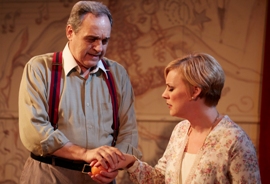 The somewhat older Kit Kat “Girl” Rosie (Sara J. Stuckey) is transformed into Cliff’s “So What?” landlady Fraulein Schneider and middle-aged Kit Kat “Boy” Maximillion (John Ross Clark) metamorphoses into her Jewish fruit-vendor suitor Herr Schultz.
The somewhat older Kit Kat “Girl” Rosie (Sara J. Stuckey) is transformed into Cliff’s “So What?” landlady Fraulein Schneider and middle-aged Kit Kat “Boy” Maximillion (John Ross Clark) metamorphoses into her Jewish fruit-vendor suitor Herr Schultz.
Dancer Lulu (Katie DeShan) becomes Fraulein Schneider’s hooker lodger Fraulein Kost with Kit Kat Girls Helga (Lyndell Higgins) and Frenchie (Annie Sherman) doubling as her sailor clients.
Kit Kat Boy Bobby (Christopher Roque*) turns out to be the very same Bobby Cliff met previously at an underground gay club in London (and our first hint that there might be something a tad homosexual about our hero).
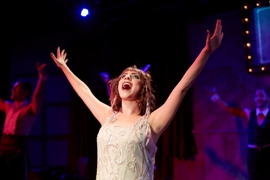 And then there’s Fraulein Sally Bowles (Shayna Gabrielle), “the toast of Mayfair,” not only the Kit Kat’s star performer but the woman who will become Cliff’s live-in lover and perform the now iconic “Mein Herr,” “Don’t Tell Mama,” and “Cabaret.”
And then there’s Fraulein Sally Bowles (Shayna Gabrielle), “the toast of Mayfair,” not only the Kit Kat’s star performer but the woman who will become Cliff’s live-in lover and perform the now iconic “Mein Herr,” “Don’t Tell Mama,” and “Cabaret.”
A number of Kander & Ebb solos acquire duet shadings at Crown City. Sally and Bobby turn “Perfectly Marvelous” into a reflection of Cliff’s bisexual longings. The Emcee provides harmonies to Cliff’s “Don’t Go,” refreshingly restored here from the 1987 revival. Most significantly, the mutually heartbroken Sally and Fraulein Schneider duet Sally’s “Maybe This Time,” and while some might complain about this newly shared focus, the pair’s harmonies recall Roxie and Velma’s Chicago duets, which could hardly be more Kander-&-Ebby.
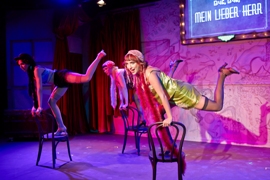 At the same time, several of Cabaret’s plot-propelling songs double as Kit Kat Klub numbers featuring choreographer Lisaun Whittingham’s imaginative dance steps, with special snaps to Whittingham’s athletic “chair-ography” in “Mein Herr.”
At the same time, several of Cabaret’s plot-propelling songs double as Kit Kat Klub numbers featuring choreographer Lisaun Whittingham’s imaginative dance steps, with special snaps to Whittingham’s athletic “chair-ography” in “Mein Herr.”
Design-wise, Crown City’s Cabaret proves refreshing too, saying Auf Wiedersehen to the gloom and grunge of the Mendes/Marshall revival and its many imitators and giving us back the color and glitz we’ve been missing, kudos shared by scenic designers Joanne McGee and Keiko Moreno’s art deco set (cabaret tables and chairs turning some audience members into Kit Kat Klubbers), the design duo’s many props, Anna Cecelia Martín’s vivid lighting, and Tanya Apuya’s skin-revealing costumes.
Colorful as this latest Cabaret revival is, director Lamb does not shy away from its darker, more dramatic hues. “Tomorrow Belongs To Me,” initially a boy soprano solo by wide-eyed tween observer Hans (John Park*), gets reprised to chilling effect when backed by footage of Nazi rallies and Hitler Youth, a reconceived “If You Could See Her” still shocks with its anti-Semitic final twist, and the approach director Lamb opts for in Cabaret’s “Finale Ultimo” gives us a horrifying look at what’s ahead for these Berliners as the trains begin heading for Dachau, Buchenwald, and Auschwitz.
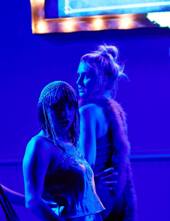 Did I mention that this Cabaret runs just about two hours including intermission, Lamb’s editing proving so invisible that despite having seen multiple Cabarets, I have no idea what might have been left out.
Did I mention that this Cabaret runs just about two hours including intermission, Lamb’s editing proving so invisible that despite having seen multiple Cabarets, I have no idea what might have been left out.
Performances could hardly be more sensational, beginning with a pair of L.A. newcomers who create indelible impressions in Cabaret’s two most iconic roles.
Gabrielle’s pitch-perfect London accent is just the start of her sizzling, sexy, star turn as Sally with vocals to match. As for Sand the recent Big Apple-to-Tinseltown transplant possesses charisma and vocal chops in equal abundance in addition to being as physically spectacular as Emcees get.
L.A. theater treasures Stuckey and Ross benefit from beefed-up roles that not only allow them to bring to Cabaret’s middle-aged lovers to touching life, but let them be part of song-and-dance sequences as well. Stuckey in particular commands the stage in “What Would You Do?” and in her powerhouse “Maybe This Time” duet with Gabrielle.
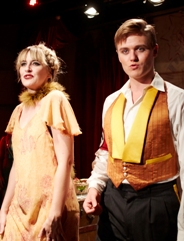 Marchak is such an appealing Ernst (both as Cliff chum and Kit Kat Boy) that his transformation from twink-next-door to hardened Nazi is especially chilling. DeShan makes for a fiery Fraulein Kost, Higgins and Sherman combine charm and sass as Helga and Frenchie, Roque is a slyly seductive Bobby, and Park’s youthful innocence and crystal-clear pipes make him a perfect Hans.
Marchak is such an appealing Ernst (both as Cliff chum and Kit Kat Boy) that his transformation from twink-next-door to hardened Nazi is especially chilling. DeShan makes for a fiery Fraulein Kost, Higgins and Sherman combine charm and sass as Helga and Frenchie, Roque is a slyly seductive Bobby, and Park’s youthful innocence and crystal-clear pipes make him a perfect Hans.
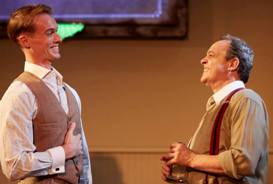 Last but most definitely not least is the breath of small-town America the terrific Pruitt brings to Berlin and the Kit Kat as Cliff, giving the character an gee-whiz innocence that slowly acquires mettle and grit as the young American’s eyes get opened to the reality surrounding him.
Last but most definitely not least is the breath of small-town America the terrific Pruitt brings to Berlin and the Kit Kat as Cliff, giving the character an gee-whiz innocence that slowly acquires mettle and grit as the young American’s eyes get opened to the reality surrounding him.
William A. Reilly merits high marks both as musical director and arranger and for providing live piano accompaniment underscored by prerecorded orchestral tracks, with snaps too to Tony Potter’s just right sound design and mixing. Projection-video designer Aaron Schumann effectively sets each new song and scene with a silent-movie style title in addition to providing some powerful newsreel footage.
Kimberly Bullock is stage manager. Zad Potter is house technical manager.
Audience members seeing Cabaret for the first time at Crown City may well wonder how the musical could ever have been done any differently, high praise indeed for Lamb and company, while those who’ve seen Cabarets galore may well feel like Cabaret virgins, touched for the very first time by this new vision of a bona fide Broadway classic, one that could hardly be fresher or more exciting.
Click here for a December review update.
*Jason Peter Kennedy and Kris Coffman alternate in the roles of Bobby and Hans.
Crown City Theater, St. Matthew’s Church, 11031 Camarillo St., North Hollywood.
www.crowncitytheatre.com
–Steven Stanley
September 25, 2014
Photos: Peter Zuehlke
Tags: Crown City Theatre Company, Kander & Ebb, Los Angeles Theater Review



 Since 2007, Steven Stanley's StageSceneLA.com has spotlighted the best in Southern California theater via reviews, interviews, and its annual StageSceneLA Scenies.
Since 2007, Steven Stanley's StageSceneLA.com has spotlighted the best in Southern California theater via reviews, interviews, and its annual StageSceneLA Scenies.







 COPYRIGHT 2025 STEVEN STANLEY :: DESIGN BY
COPYRIGHT 2025 STEVEN STANLEY :: DESIGN BY